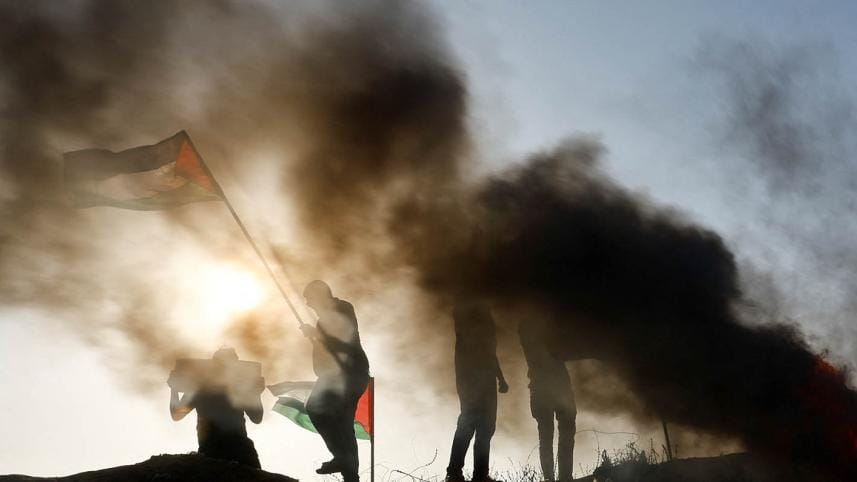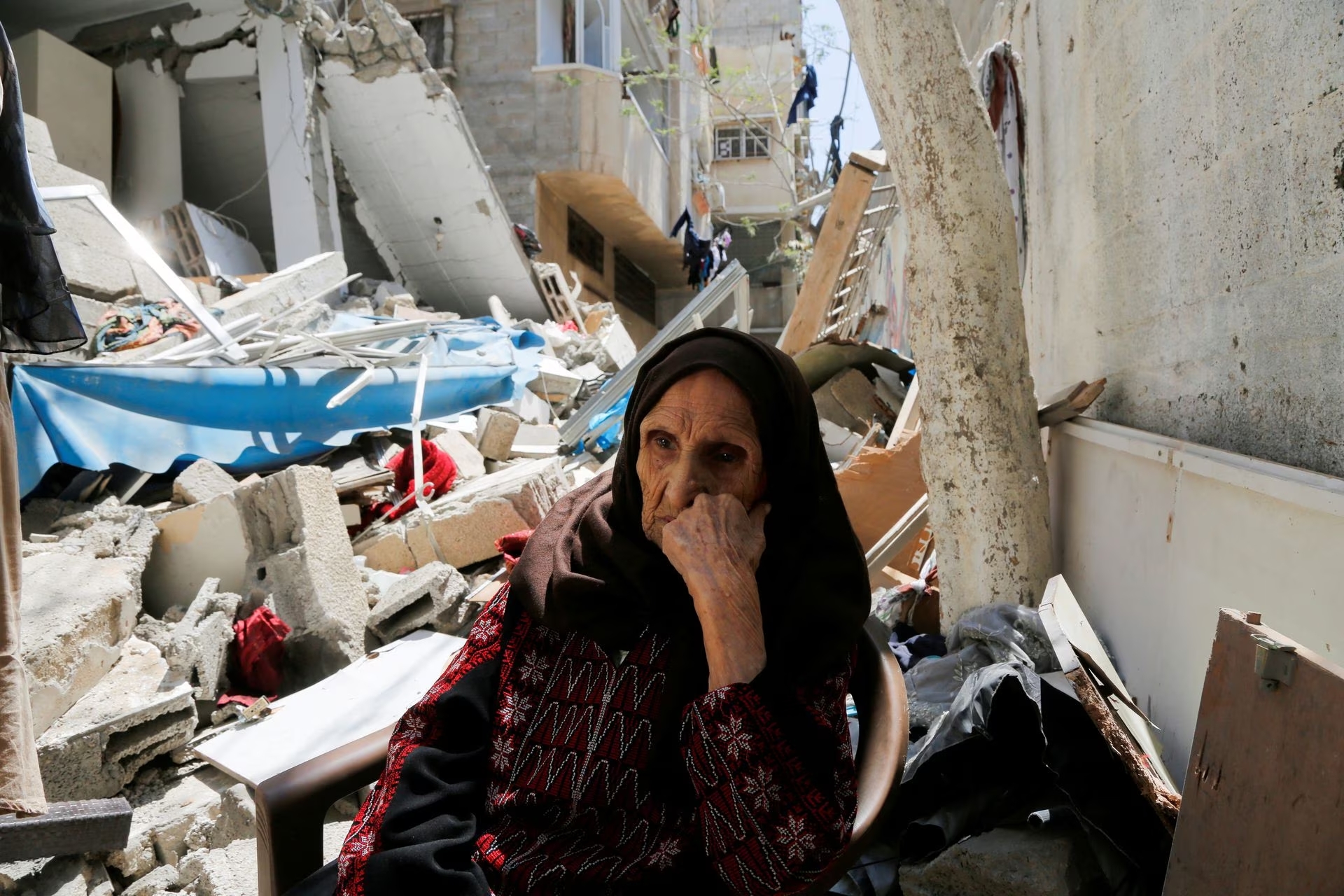Bogged by internal tensions, Israel looks to Palestine for distraction

As internal tensions intensify in Israel over Prime Minister Benjamin Netanyahu's fresh attempts to suppress the power of the country's judiciary, with hundreds and thousands of Israeli pro-democracy protesters taking to the streets to raise their voice against the move, Israel ramps up its attacks on West Bank, in blanket, large-scale aerial and ground offensives to supposedly clamp down on "terrorists." The result: killing of civilians including children, displacement of thousands, and fresh resolve among the Palestinians to fight for their right to self-determination.
Since the beginning of the year, attacking Palestine has been Israel's way of diverting people's focus from political tensions at home. As part of this, Israel has launched a string of operations in various parts of the occupied West Bank, including Jenin refugee camp, where more than 14,000 Palestinians live in less than half-square kilometre area. The latest operation, dubbed Operation Home and Garden by the Israel Defense Forces (IDF), led to the loss of 12 Palestinian lives – including three children – and displacement of at least 3,000 civilians from their cramped abodes. More than a hundred have been injured. My Twitter feed is still flooded with images of bullet-ravaged and bombed homes, fresh blood, scared children fleeing for their lives with their families, and mourners carrying the dead for burial.
These attacks on Jenin camp are considered some of the most violent and atrocious in recent years, and for obvious reasons: the air and ground offensives contain drone assaults, use of Apache helicopters, F-16 jet fighters, armoured vehicles, significantly high number of soldiers, creating an atmosphere of fear and vehemence through the sheer size of the force and elements. The latest raid on Jenin, which started on July 2 and lasted two days, just days after the Eid-ul-Azha, one of the largest religious festivals of Muslims, is considered the longest and largest operation by the IDF in the West Bank since the Second Intifada.
These "raids," "offensives," "operations," whatever one calls them, raise certain questions about Israel's intentions. First of all, even if actual "terrorists" were present in the Jenin camps, was this show of force necessary? Even if homespun explosives were being made and stored in these poverty-ridden camps, was the scale of these raids proportional? Was a surgical strike more appropriate, since these raids are more target-focused? Was the ruthless collective punishment of the Palestinian civilians justified? Does Israel even have a plan – what are they trying to achieve through these raids?
Unsurprisingly, Israel's allies, including the US and the UK, are supporting this mass killing of civilians, saying Israel has the right to defend itself. But what about the right of the Palestinians to self-determination, their self-defence?
While Jenin is still reeling from multiple deadly IDF operations, in Al-Lubban ash-Sharqiya village, south of Nablus, in the West Bank, colonial Israeli settlers have torched "tens of dunums planted with agricultural crops and dozens of olive trees." Acres of agricultural land have been destroyed, affecting the livelihood of helpless Palestinian farmers. This is a criminal act. Unfortunately, this is not the first time they have done so, and it will not be the last. With the support and blessing of the Israeli regimes, the colonial Israeli settlers have turned this into a regular ritual. Now these criminals are being further emboldened by the current Israeli regime. In a recent move, they are allowing illegal Israeli settlers in Palestine who shoot at Palestinians to keep their guns. This is part of new measures imposed by Itamar Ben-Gvir, Israel's far-right national security minister. Not that it made much difference before: after shooting Palestinians, while the guns were immediately confiscated and the shooters taken into custody for further questioning, most of them would be let off without charges.
The worst victims of Israeli aggression on Palestine are perhaps the children. They are being killed – more than 27 Palestinian children have been killed this year alone by Israel; last year the number stood at more than 30 – injured, maimed, made orphans, and held and tortured, even sexually assaulted by the Israeli forces. A research by Save the Children revealed that four out of five Palestinian children detained by Israeli forces in the military detention system are beaten, and 69 percent of them are subject to strip search. It is estimated that between 500 and 1,000 children are detained by the Israeli military each year.
As I think of these children being shot in the eye (five-year-old Khaled Malalha lost an eye to rubber bullets fired in his face by Israeli forces) in the head (two-year-old Mohammed al-Tamimi shot in the head by Israeli forces), and beaten up till their bones turn into fragments, I cannot help but remember the frightened expression on the face of 12-year-old Muhammad al-Durrah, being sheltered by his father Jamal al-Durrah, from Israeli fires, on the second day of the Second Intifada. It was on September 30, 2000. Both father and son were killed. On multiple occasions, I posted the photos of the last moments of the father-son duo on my social media handles, and every time they were labelled as "graphic images." I cannot help but wonder, would the photo treatment be different if they had different nationality?
Years have passed since the Second Intifada, but the situation has not changed for the Palestinians. They serve two purposes for the Israelis: 1) using their so-called threat of Palestinian "terrorists," Israel secures billions of dollars in funding from its Western allies each year, and take the licence to freely equip themselves with state-of-the-art warfare technology; and 2) the Israelis use the fear of the Palestinian bogeymen to suppress their own people, as the successive regimes have been doing for so many years.
The Israelis will keep provoking the Palestinians to act so that they can play the victim card. But the international community – except its selectively blind allies – should know better, and must stop Israel in its bloody tracks. Israel should be tried and punished for war crimes, and the Palestinians' right to self-determination should be ensured. Nothing less is acceptable.
Tasneem Tayeb is a columnist for The Daily Star. Her Twitter handle is @tasneem_tayeb




 For all latest news, follow The Daily Star's Google News channel.
For all latest news, follow The Daily Star's Google News channel. 




Comments